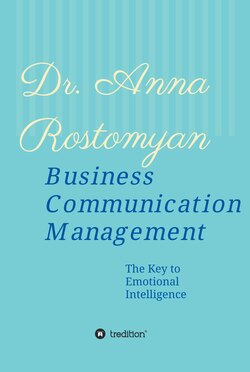Читать книгу Business Communication Management - Dr. Anna Rostomyan - Страница 8
На сайте Литреса книга снята с продажи.
ОглавлениеPreface
Business environment increasingly grows multifaceted and multicultural, where human capital becomes the only sustainable source of competitive advantage for any organization. Communication mainly consists in coding and decoding information on diverse issues with the people whom we encounter on various occasions. It is the mutual exchange of understanding with the receiver of the information.
When talking about Business Management, we first of all have to speak about effective communication, which is the essence of productive management as we deal with human beings. The basic functions of management, such as Decision Making, Planning, Organizing, Staffing, Directing and Controlling, cannot be performed efficiently and thoroughly without effective communication.
Business Communication actually involves instant and constant flow of information. Communication indeed plays a very important role in the process of directing and controlling the people in each and every organization. Hence, there should be effective communication between superiors and subordinated employees in any organization by means of flat hierarchical operation systems, as well as between an organization and the society at large, since it is also very essential for the development of success and the growth of an organization (Ternès & Rostomyan, 2011b).
Although it might sound trivial or even irrelevant to bring up such basic matters as language, meaning, interpretation and communication, these are the most fundamental components of arguments — even more fundamental than propositions, inferences, and conclusions. We cannot make sense of an argument without being able to make sense of the language, meaning, and purpose of what is being communicated in the first place. Hence, the present book will give a glimpse into diverse relevant components of communication so that to have a better understanding of it, as in case you have an idea of the processes going beyond communication, you will become better communicators.
In fact, language is a subtle and complex instrument used to communicate an incredible number of different things, but for our purposes here we can reduce the universe of communication to four basic categories: information, direction, emotion, and ceremony. The first two are often treated together because they express cognitive meaning while the latter two commonly express emotional meaning. Language, indeed, is the basic means of communication between human beings. And just as it is the basic form, it is also the most developed one. We cannot communicate in any real sense without language, other than through gestures, facial expressions, bodily movements, and some other non-linguistic means; we also do communicate through some other non-verbal forms like the visual arts, e.g.: painting and sculpture, through dance, architecture, engineering, fashion, design, and the like, yet the culmination of true, articulate, communication is undoubtedly being realized via language. Actually, language has an irreplaceable role in our life, since it is very crucial in building successful and peaceful relations in our society, and business is not an exception.
As far as the relation of logic and emotion is concerned, Cicero tended to place a greater emphasis upon the emotive language rather than the logical. He points out to the fact that very often the decisions of those who decide greatly depend on the level of emotionality of the speaker. He does not claim that it is a disadvantage and should thus be avoided. Just on the contrary, he even advises that:
“Men take a decision oftener through feeling than through fact or law. They are moved by evidences of character in the speaker and in his client. The only way to rebut feeling is by feeling.” (Cicero, 1895: 178)
Thus, the communication of information may be the most frequently viewed as thought-of use of language, where emotions play a vital and sometimes even a dominant role and place of which should not be underestimated. Though undeniably the basic means of conveying information is through statements or propositions, namely the building blocks of arguments, some of the “information” here might not be true because not all arguments and felicity conditions are always valid; however, for the purposes of studying logic, information being conveyed in a statement may be either false or true depending on the extralinguistic features, and, thus, the decoding process of emotional information can be really very challenging. Yet, in case credibility, trust, loyalty, unique style and individual identity are intermingled, every business is sure to flourish.
The present book studies the role of emotion in speech, their essence, as well as the expression and management of outward displays of emotions across cultures and situations, studying diverse emotion expression management techniques for the benefit of communicative conflict reduction and interpersonal peaceful relations, especially in the business environment.
This work outlines the importance of Emotional Intelligence (EQ) as an addition to your IQ (rational quotient) in the business cluster and other spheres of human activity. In fact, your emotional intelligence lies in your ability in efficiently handling your very own emotions, understanding your own and the emotions of the others, communicating your emotions effectually, empathizing with others, overcoming challenges, stress and communicative conflict; thus, helping you in building peaceful and harmonious, successful and effective relationships.
Having conducted a thorough interdisciplinary linguo-cognitive, psycholinguistic, neurolinguistic, sociolinguistic, phonetic, and pragmalinguistic analyses, we mainly take into consideration the supreme and subtle role of emotions in our lives, which are not here viewed as mere sensations, but rather special phenomena containing rational elements, which interplaying with one another altogether build our higher cognitive processes.
The next section gives you an idea about communication and emotion management techniques, which help you raise your EQ.
